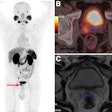
Metal-containing radiopharmaceuticals are highly effective at detecting early markers of Alzheimer's disease, and they are synchrotron-independent and long-lived, according to a review by Russian researchers published in the International Journal of Molecular Sciences.
The development of imaging agents for Alzheimer's is limited due to the presence of the blood-brain barrier (BBB), which restricts the substance from reaching the cerebral target. This makes it difficult to develop new treatments for brain diseases or new radiopharmaceuticals for neuroimaging of the brain.
But the use of metal-containing radiopharmaceuticals could improve the accessibility of diagnostic imaging for Alzheimer's disease patients, according to a team of researchers from Laboratory of Biophysics at NUST MISIS, Lomonosov Moscow State University, and D. Mendeleev University of Chemical Technology of Russia.
Copper-based coordination compounds for PET, gallium-based coordination compounds for MRI, and technetium-based coordination compounds for SPECT showed the most promising results, according to the review.



















